Natasha calls Senate “secret society” where members are intimidated, silenced

Suspended Kogi Central Senator Natasha Akpoti-Uduaghan has made serious allegations against the Nigerian Senate, describing it as a “secret society” where lawmakers are intimidated into silence by the Senate President, Godswill Akpabio. In an interview with the BBC Hausa, Akpoti-Uduaghan claimed that senators are too afraid to voice differing opinions for fear of losing opportunities, privileges, and their ability to speak in the Senate. Akpoti-Uduaghan further accused the Senate leadership of creating a culture of fear, where any criticism of the Senate President or opposing his views could result in retaliation, including being sidelined from parliamentary activities. “There is this culture of fear among the senators. If you dare to criticise the Senate President or express a differing opinion, you risk having all opportunities blocked, and you will not be allowed to speak,” she said. In addition to the claims of intimidation, Akpoti-Uduaghan made explosive allegations of sexual harassment against Senate President Akpabio. She recounted an incident where she was teased by Akpabio and five other senators for not wearing her wedding ring, with comments that included, “Is there another way of betraying your husband?” and “Your husband seems to be enjoying you… you might be able to twist that beautiful waist of yours.” According to Akpoti-Uduaghan, the comments were made in a public Senate session, with others laughing along. When questioned about the validity of her allegations, Akpoti-Uduaghan affirmed that she has evidence to support her claims of misconduct. She also referenced a previous incident where Akpabio allegedly made advances toward her, suggesting a pattern of inappropriate behaviour. The accusations have sparked controversy, with Senate Deputy Majority Leader Senator Onyekachi Nwebonyi vehemently denying the allegations. Nwebonyi dismissed Akpoti-Uduaghan’s claims, insisting that there was no attempt by the Senate President to harass or intimidate her either privately or during Senate proceedings. READ ALSO: Senate suspension: FG intervenes, groups root for Natasha, Akpabio “Natasha’s behaviour in the Senate does not reflect that. There was never a time the Senate President made any attempt to harass Senator Akpoti at his home or made any inappropriate statements in the Senate,” Nwebonyi said. Nwebonyi also rejected the notion that the Senate functions as a “cult,” where members are silenced or gagged by leadership. He maintained that the Senate operates as a space for free debate and that Akpoti-Uduaghan’s account was inaccurate. The conflict between Akpoti-Uduaghan and the Senate President escalated after she was suspended for six months on March 6, following a heated altercation over a seating arrangement she believed was intended to undermine her. The suspension was announced after a confrontation between the two, which Akpoti-Uduaghan claimed stemmed from her refusal of Akpabio’s alleged advances. In the wake of her suspension, Akpoti-Uduaghan escalated her claims to the international stage, lodging a petition with the United Nations’ Inter-Parliamentary Union. She accused the Nigerian Senate of political victimisation and called for international intervention to hold the Senate accountable. The senator also highlighted a series of punitive measures imposed upon her following her suspension, including withdrawal of security, salary cuts, and a ban from the National Assembly for six months. The controversy surrounding Akpoti-Uduaghan’s suspension continues to attract national and international attention, as the Kogi senator demands accountability for what she describes as political and gender-based retaliation. READ ALSO: SENATE: Apologise and be forgiven, Akpabio tells Natasha
Shettima urges National Assembly to prioritise unity, national development
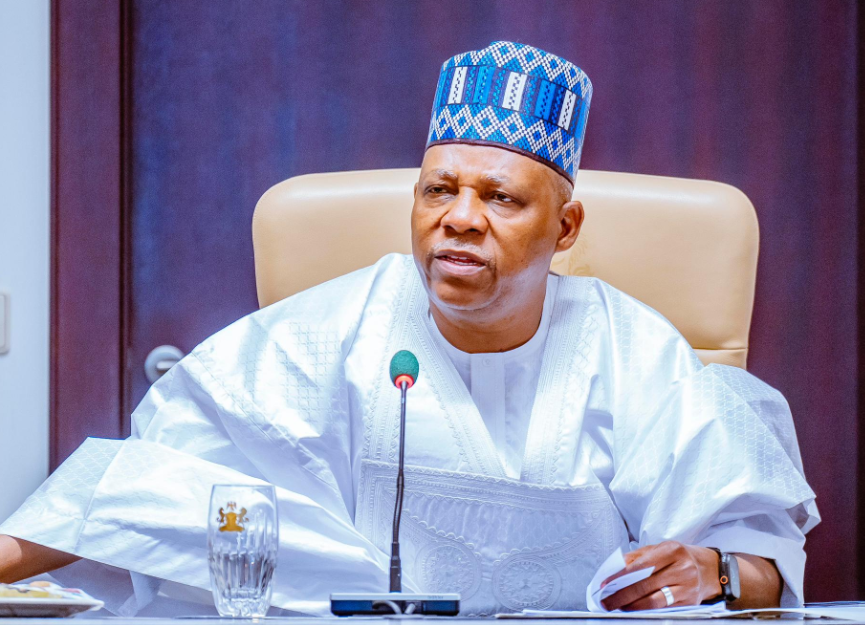
Vice-President Kashim Shettima has called on the National Assembly to honour its sacred responsibility of leadership by prioritising unity and national development over political divisions and partisan interests. Shettima made the call during an Iftar (breaking of Ramadan fast) event hosted by President Bola Tinubu for the leadership and members of the House of Representatives at the Presidential Villa, Abuja, on Monday, March 17. Speaking on behalf of President Tinubu, Shettima urged the lawmakers to embrace their roles with humility and a shared commitment to progress. He emphasised the importance of cooperation and collaboration in fostering national growth, stating: “In the end, history will not judge us by the number of personal battles we fought against one another, but by the bridges we were able to build together.” Shettima continued, “We are gathered here this evening not as adversaries in a contest for power, but as partners in the noble task of nation-building.” Reflecting on the significance of Ramadan, which coincides with the Lenten season, the Vice-President called for deep introspection and a renewed commitment to Nigeria’s unity. He noted that the sacred month served as a reminder to choose “stability over strife, collaboration over conflict, and dialogue over discord.” “What binds us as a nation is far greater than what divides us,” he said. In his remarks, Shettima commended President Tinubu’s leadership, describing him as a “man of vision and inclusivity.” He further praised the President for his trust in the National Assembly, adding, “In President Tinubu, you have not just a leader you can trust, but a leader who trusts you. He sees you as stewards of our democracy, as voices of the people, and as partners in our shared aspiration to build a better Nigeria.” The Vice-President also expressed optimism about the country’s economic trajectory, asserting that the government’s policies were yielding positive results. “We are now on the path to sustained economic growth, and with perseverance, we will create a Nigeria where every citizen can thrive,” Shettima stated. He also lauded the Speaker of the House of Representatives, Abbas Tajudeen, and the House leadership for promoting harmony within the legislature. “There can be no development without peace, and there can be no peace without development. The unity within the House is a testament to our collective resolve to move Nigeria forward,” he added. Shettima urged the legislators to govern with empathy, fairness, and justice, reminding them that their positions were a sacred trust bestowed by the Nigerian people. “Leadership is not about personal gain; it is about service. It is a burden vested in us by God, tested by history, and measured by the impact we leave behind,” he said. Earlier, Speaker Abbas Tajudeen expressed gratitude to President Tinubu for the invitation and his continued respect and concern for the House of Representatives. Reflecting on the importance of Ramadan, the Speaker urged both Muslims and Christians to dedicate the fasting period to prayer for the country. “As we all know, the month of Ramadan entails many things, one of them is reflection; where were you before, where are you now, and where do you want to be? I believe Nigeria, more than ever before, needs this type of reflection,” Abbas said. He called on citizens to pray for the country’s economy, security, and for the leadership to be guided in their decisions. “Prayers for the economy; prayers for improved security, prayers for the leaders, and prayers for the citizens,” he added. In a show of solidarity, Abbas pledged that every member of the House of Representatives supported President Tinubu’s leadership. He also noted that the policies of the administration were aimed at improving the lives of Nigerians. As a gesture of goodwill, Abbas announced that, on behalf of the House of Representatives, the sum of N705 million had been donated to the President. The donation, which represents a six-month 50 per cent salary deduction from each member, was intended to support the humanitarian initiatives of the President and assist vulnerable people across the country. READ ALSO: Shettima: FG committed to Plateau’s stability, economic growth
Explosion hits major oil pipeline in Rivers

Explosion has rocked the Trans-Niger Pipeline at Bodo area of Rivers State. The section of the major pipeline which is in Bodo, Gokana Local Government Area of the State is said to be on fire. At press time the cause of the explosion has not been ascertained, but the pipeline facility is currently under heavy fire It has not also been determined if the cause of the explosion is human interference, following the threats by some militant groups to attack oil installations in the region if the Federal government withholds the allocation of Rivers State following the political crisis in the state. It was gathered that incident happened Monday night on the major export pipeline which transports crude to the Bonny Terminal.
Senate leader defends Tinubu over fuel subsidy removal, accuses cabal of sabotage
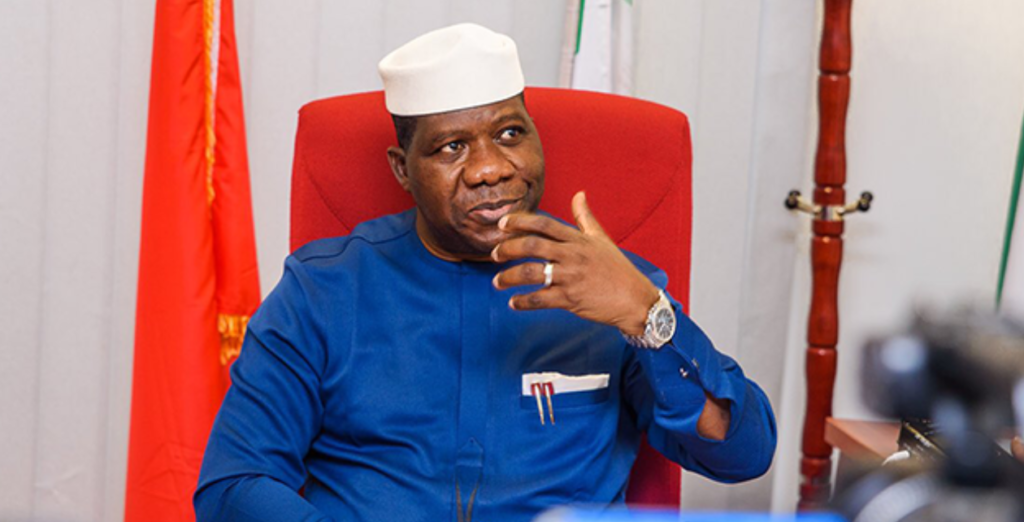
The Leader of the Senate, Senator Opeyemi Bamidele, has outlined the key challenges faced by President Bola Tinubu’s administration during the first 18 months, with a particular focus on the controversial removal of the fuel subsidy. Bamidele, who represents Ekiti Central in the Senate, stated that the primary difficulty the President encountered came not from ordinary Nigerians, but from those who had benefitted from the subsidy—many of whom, he claims, were part of a powerful cabal. These individuals, according to Bamidele, sought to undermine the administration for their own personal gain, making it harder for the government to govern effectively. The lawmaker shared his views in a statement released by his Directorate of Media and Public Affairs on Monday. Bamidele clarified that the beneficiaries of the fuel subsidy were not the general public, but rather a select group of individuals who had easy access to the subsidy. He strongly emphasised that these individuals had exploited the scheme under the guise of helping the masses, who he claimed never truly benefited from it. “It was not the common men and women of this country who were benefiting from the fuel subsidy,” Bamidele said. “It was members of the cabal who had access to it, and they were the ones taking away this privilege on behalf of the masses. And the masses did not benefit from it.” The Senate leader further explained that the removal of the subsidy was a decision aligned with an agreement made by the 9th National Assembly. According to Bamidele, the subsidy was no longer sustainable and had to be phased out in the interest of the country. “I am convinced that the President did the right thing by removing the fuel subsidy,” he said. “The 9th National Assembly had already made provisions for its removal by May 2023. The removal was inevitable, and the President merely acted in line with the policy direction that had been agreed upon before his inauguration.” Bamidele also clarified that the National Assembly had only allocated funds for the subsidy until May 2023. Therefore, even if President Tinubu had not announced its removal, the subsidy would have ended shortly after his inauguration. “The National Assembly made provision for the fuel subsidy until May 2023. Whether or not President Tinubu mentioned it, the subsidy would have ended shortly after his inauguration. The funding simply wasn’t there,” he explained. READ ALSO: I removed fuel subsidy to protect the youth, future – Tinubu The Senator added that continuing the subsidy would have put the country in a fiscal crisis, leading to cuts in essential transfers to sub-national governments. “Retaining the subsidy would have plunged the country into a fiscal crisis. The funds were simply unsustainable, and the country would have suffered far worse consequences,” he stated. Bamidele also expressed confidence that the 2025 Appropriation Act would effectively address Nigeria’s socio-economic challenges, not just at the national level, but also at state and local levels. He pointed out that while the increased statutory transfers to sub-national governments often went unnoticed, they were vital to fostering development across the country. He also stressed that the government had shifted its budgetary priorities, allocating less to recurrent expenditure and more to capital expenditure. This, he suggested, marked a significant departure from previous practices and would result in more sustainable public spending. “What is important now is to focus on the 2025 budget,” he said. “Does it prioritise the welfare of the people? Does it address critical sectors like education, healthcare, and agriculture? Compared to previous years, the federal government is now spending less on consumables and focusing more on capital expenditure, which is a significant shift.” Furthermore, Bamidele commended President Tinubu for his decision not to lay off public sector workers, despite the economic challenges. He argued that such a move would have exacerbated the country’s problems, especially given the ongoing security challenges that had disrupted agricultural activities. He expressed optimism about the improving security situation, highlighting that many internally displaced persons (IDPs) were gradually returning to their homes and farmers were resuming their work. “The security situation is fast improving across the country. People are starting to return to their farms, and things are steadily getting better,” he said. “We are gradually coming out of the bad situation we’ve been in.” Concluding his statement, Bamidele reiterated that the measures taken by the government, including the removal of the fuel subsidy, were necessary to stabilise the economy and put Nigeria on a path of recovery. He encouraged the public to focus on the long-term benefits of these policies and the broader picture of national and sub-national development. “Retrenching workers is not an option before this administration. It would cause even more problems for the country,” he added. “The steps we are taking are necessary to stabilise the economy and restore the country to growth.” With these assertions, Senator Bamidele offered a robust defence of the government’s actions, affirming that President Tinubu’s policies were in line with the country’s long-term interests despite the challenges Nigeria continues to face.
Akpabio: Senate to reintroduce statutory delegates for 2027 primaries
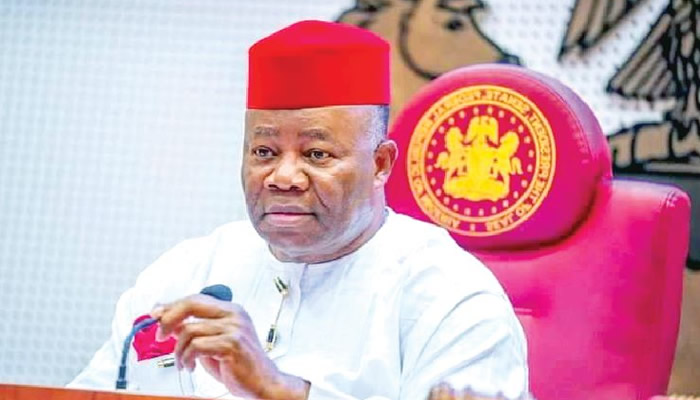
The President of the Senate, Godswill Akpabio, has announced that the 2022 Electoral Act will be amended to allow statutory delegates to participate in political parties’ primaries for the 2027 general election. This amendment, Akpabio explained, seeks to address an important oversight in the previous electoral law. Speaking during a meeting with the national leadership of the Nigerian Bar Association (NBA) in Abuja on Monday, Akpabio highlighted that the omission of statutory delegates from the primaries under the 2022 Electoral Act had created significant issues. He referred to this oversight as a mistake that must be rectified to ensure a more inclusive and balanced democratic process in future elections. Akpabio noted that the exclusion of key political figures, such as the President, Vice President, Governors, Deputy Governors, Senate President, Deputy Senate President, and members of Parliament, from participating in the primaries had led to the creation of what he called “super-delegates” during the 2023 elections and 2022 party primaries. “There were defects in the last Electoral Act that was amended. We inadvertently created what I may call super-delegates in the 2023 elections and 2022 primaries,” Akpabio explained. “Without any particular intention, we excluded key political figures from voting, and only ad hoc delegates were allowed to participate. This, in turn, limited the democratic process and led to imbalances in candidate selection.” The Senate President emphasised that all statutory delegates—ranging from the President and Vice President to local government chairmen—had been left out, thus restricting the range of voices in the selection of flag bearers for legislative, gubernatorial, and presidential elections. He pointed out that only those who contested to become ad hoc delegates were allowed to participate, creating a skewed process. “These are areas that we think we can look at to make our democracy more participatory,” Akpabio said. “Democracy is all about numbers, and by excluding these critical figures, we limited representation and participation in the primaries.” Furthermore, Akpabio raised concerns about the role of the Independent National Electoral Commission (INEC) in candidate selection. He argued that political parties should have the final say in choosing candidates who align with their manifestos and have a proven record of service to the people, rather than relying on INEC to decide who qualifies as a candidate. “We need to review the powers given to INEC. At one point, it seemed as if INEC was the ultimate arbiter in deciding who could run as a candidate,” Akpabio explained. “Political parties should have the power to select candidates who will best represent their manifesto, have integrity, and a proven track record of performance.” In addition to electoral reforms, Akpabio addressed the issue of quackery in the legal profession. He urged the NBA to take more robust action to rid the profession of unqualified individuals, some of whom had even risen to senior positions within the bar. READ ALSO: SENATE: Apologise and be forgiven, Akpabio tells Natasha He stressed that this undermined the integrity of the legal system and called on the NBA to take a stronger stance against such practices. During the meeting, the National President of the NBA, Afam Osigwe (SAN), also called on the National Assembly to include justice sector reforms in the ongoing constitutional amendments. He shared an anecdote from the 1990s when he encountered a quack in the Igbosere Magistrate Court in Lagos, a person who had studied History at the University of Calabar but claimed to have studied Law. Both Akpabio and Osigwe’s remarks underline the ongoing efforts to address electoral and professional challenges, aiming for a more inclusive, accountable, and transparent system in Nigeria.
Reps donates N705m to support vulnerable Nigerians during ramadan
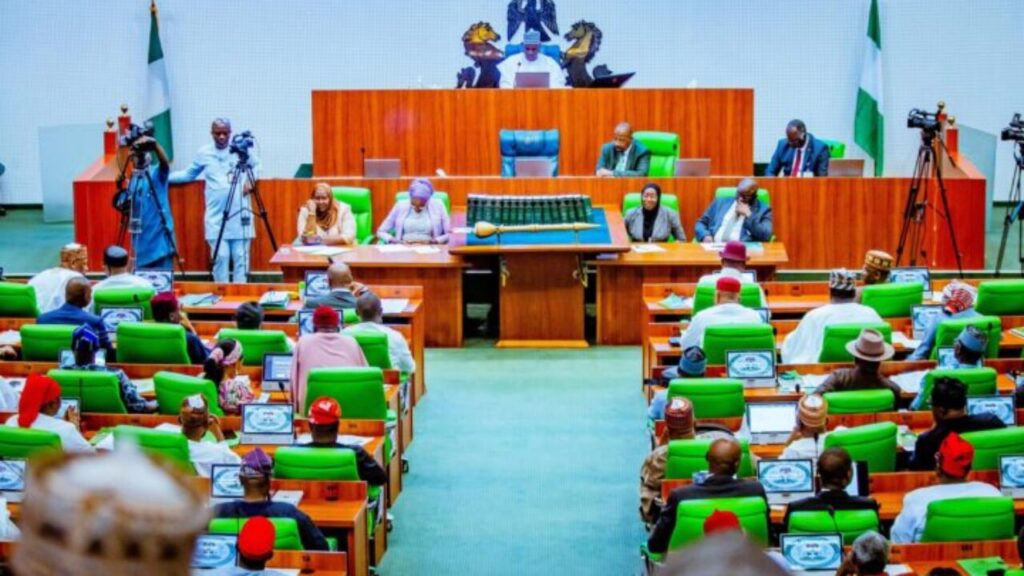
The House of Representatives has donated N705 million to the Federal Government to support vulnerable Nigerians during the holy month of Ramadan. Speaker Tajudeen Abbas made the announcement on Monday during an Iftar dinner hosted by President Bola Tinubu at the Aso Rock Presidential Villa in Abuja, where he was joined by the principal officers of the House. Presenting the donation, Speaker Abbas expressed the lawmakers’ commitment to alleviating the economic hardship faced by the most vulnerable citizens, particularly during Ramadan, a time of reflection and charity. The donation underscores the House’s ongoing efforts to support the welfare of Nigerians during difficult times. More details to follow… RELATED NEWS: Reps approve Tax Reform Bills, okay 7.5% VAT
Sowore supports NYSC member Rita amid controversy over viral video criticising Tinubu
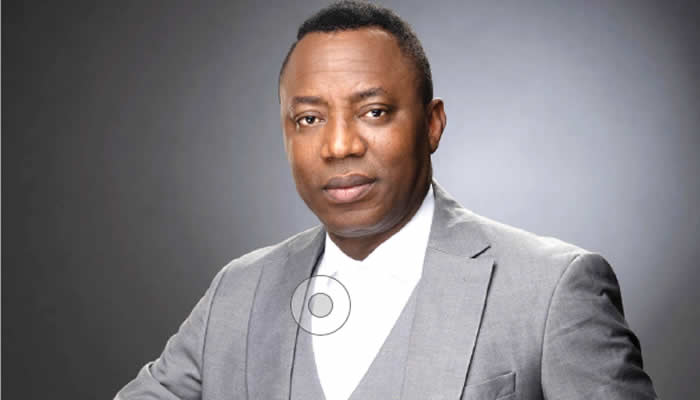
Human rights activist and 2023 presidential candidate, Omoyele Sowore, has extended his support to Ushie Rita Uguamaye, the National Youth Service Corps (NYSC) member at the centre of a growing controversy after she posted a viral video criticising President Bola Tinubu’s administration. In a video shared on social media platform X (formerly Twitter) on Monday, Sowore revealed that he had met with Uguamaye in Lagos and would be accompanying her to the NYSC Local Government Inspector (LGI) office. He also confirmed that a team of lawyers would be present during the visit. “The journey with youth corper, Ushie Rita Uguamaye, has commenced in Lagos. She is scheduled to appear before the LGI today and we will escort her to their offices. We are all en route with attorneys,” Sowore wrote in the caption, underscoring the seriousness of the situation. The 2023 NYSC member became the subject of intense scrutiny after posting a TikTok video in which she openly criticised the economic conditions in Nigeria and expressed dissatisfaction with President Tinubu’s leadership. The video quickly went viral, sparking a heated national debate on free speech, political dissent, and the risks associated with speaking out against the government. Uguamaye subsequently claimed that she had received threats in response to her comments, further intensifying the controversy. She also shared a screenshot on social media of an invitation from the NYSC, summoning her to appear at the LGI office at Eti Osa 3 on Monday at 10:00 a.m. Sowore’s involvement has brought even more attention to Uguamaye’s case, with many watching closely to see how the NYSC and other authorities will respond to the incident. The activist’s public backing highlights the ongoing concerns about freedom of expression in Nigeria, particularly among young people. As of now, the NYSC has yet to release an official statement regarding the matter. Uguamaye’s case has drawn widespread support from various quarters, including political figures and human rights advocates, who view her situation as emblematic of the broader challenges to free speech and political expression in the country. RELATED NEWS: SERAP threatens legal action against NYSC over corper’s intimidation Amnesty slams NYSC for threatening Lagos corper over anti-Tinubu video
BREAKING: Jandor makes surprise return to APC
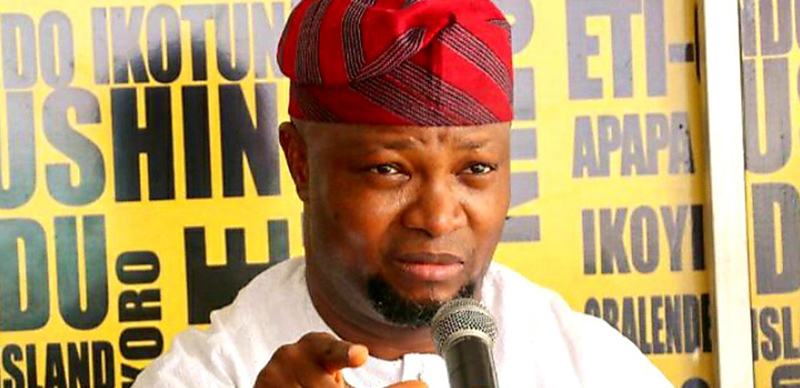
Dr Abdul-Azeez Adediran, widely known as Jandor, the former governorship candidate for the Peoples Democratic Party (PDP) in Lagos State, has officially defected to the All Progressives Congress (APC), citing internal conflicts and a lack of discipline within the PDP as his main reasons for the move. The announcement was made during a press conference held on Monday at his office in Ikeja, Lagos, weeks after he had tendered his resignation from the PDP. Jandor expressed his frustration with the party’s internal dynamics, particularly pointing to the failure of party leadership to address what he described as “anti-party activities” during the 2023 general elections. “Our story in the PDP was one of working with perennial political saboteurs,” Jandor said. “But we have resolved to love our future more than we hate our past.” He continued by explaining that, after extensive consultations with family, political associates, elder statesmen, and well-meaning Lagosians, he came to the conclusion that the fundamental goal of any political party should be to win elections and form a government that serves the welfare and development of the people. “Having identified that the primary purpose of a political party is to win elections, we have decided to join a political party that places the priority of winning above all else—regardless of who is on the ballot. We have decided to return to the All Progressives Congress.” Jandor revealed that his decision to rejoin the APC was not made in isolation. He disclosed that he had engaged in talks with political leaders and supporters across various parties, including the Social Democratic Party (SDP), African Democratic Congress (ADC), and the Young Progressive Party (YPP), before ultimately choosing the APC. In addressing questions regarding his previous departure from the APC, Jandor referred to a Yoruba proverb, suggesting that one cannot truly know which option is best until they have experienced both. “Before you are quick to remind me of the reasons upon which we left APC in the first place,” he remarked, “let me respond with a popular Yoruba adage: ‘If a woman has not tried two husbands, she probably would not know which is better.’” He went on to highlight the leadership contrast between the APC and the PDP in Lagos, stating, “In APC, we have a leader, and even if you disagree with his choice of candidates, you can never fault his desire to win for the benefit of the party and the state. On the other hand, in Lagos PDP, there is a leader who repeatedly works against his own party and dashes the hopes of many loyal members.” Jandor stressed that his return to the APC was a thoughtful decision, driven by his firm belief in the importance of unity among progressives for the betterment of Lagos State. He also acknowledged the role of President Bola Tinubu’s Chief of Staff, Femi Gbajabiamila, and Tinubu’s son, Seyi Tinubu, in persuading him to rejoin the ruling party. “I would like to extend my sincere gratitude to President Bola Tinubu, who recognised our modest contributions to democracy and nation-building,” Jandor said. “I must also thank Rt. Honourable Femi Gbajabiamila, who has been persistently encouraging me to come ‘home’. When news of my resignation from the PDP broke, Seyi Tinubu immediately reached out to encourage me to return.” Jandor assured his supporters that his decision was made with Lagos’ best interests in mind and called on them to join him in this new political chapter. “We remain committed to the values of service, integrity, and progress. Together, we will continue to champion the cause of a better Lagos for present and future generations,” he said. This defection marks a significant shift in the political landscape of Lagos State, with Jandor’s return to the APC expected to have considerable implications for the party’s political strategies going forward.
Adebayo predicts Tinubu’s defeat in 2027, vows to run for Presidency again
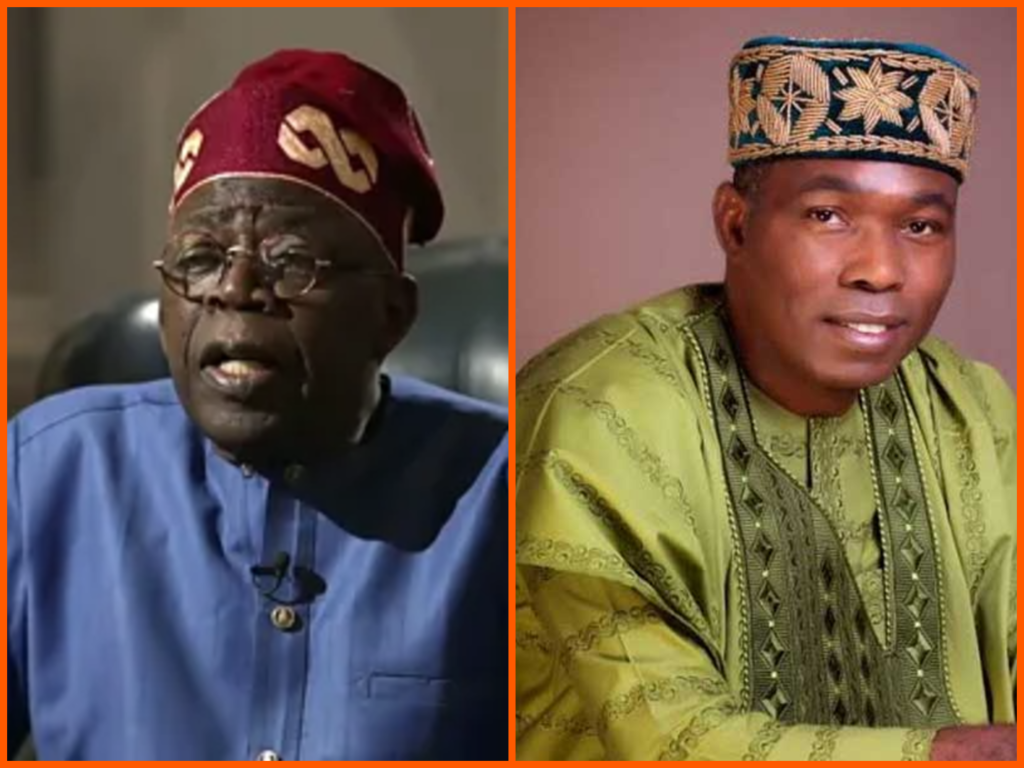
Adewole Adebayo, the 2023 presidential candidate for the Social Democratic Party (SDP), has confidently predicted that President Bola Tinubu will be ousted in the 2027 general election. Adebayo also boldly claimed that his party would produce the next Nigerian President. Appearing on Arise Television’s The Morning Show on Friday, March 14, Adebayo expressed certainty about Tinubu’s defeat, asserting, “Tinubu is going to be removed from power, that one is sure, and there would be an SDP president.” He added that the SDP’s chances of victory in 2027 were assured, signalling that his party was poised to lead the country in the next election cycle. Adebayo, who is a prominent figure within the SDP, further revealed his ambition to contest the presidency again in 2027. He made it clear that he would be the party’s candidate, irrespective of any high-profile defections to the SDP in the coming years. “Let us understand something. I don’t worry about that; everybody who is coming in knows I will run in 2027,” Adebayo stated, unfazed by the political manoeuvrings of other party members. “Any coward who will feel threatened by people coming to his party cannot be president,” he added, implying that only the confident and unshakeable could lead the nation. His comments come in the wake of the high-profile defection of former Kaduna State Governor Nasir El-Rufai to the SDP. Since El-Rufai’s shift to the party earlier this week, there has been increased speculation about his political future, with reports suggesting that he may play a key role in the party’s preparations for 2027. Despite the political weight of El-Rufai’s defection, Adebayo remained undeterred, describing the former governor as a hardworking and patriotic Nigerian. He acknowledged El-Rufai’s effectiveness in areas where government performance has been lacking. “The reason why I welcome El-Rufai to my party is that I see him as a patriotic Nigerian, hardworking, very effective in an area where we don’t have effective people in government,” Adebayo said. El-Rufai’s defection to the SDP has prompted discussions about the potential reshaping of the political landscape ahead of the 2027 elections. The former governor, known for his controversial yet influential leadership, is expected to make significant political moves to recruit more politicians to the SDP, further positioning the party as a formidable contender in the race for the presidency. READ ALSO: Adebayo welcomes El-Rufai to SDP, calls for a new era of good politics
Malami denies Obasanjo’s corruption allegations, defends role in Presidential pardons

The former Attorney General of the Federation and Minister of Justice, Abubakar Malami, SAN, has vehemently denied corruption allegations levelled against him by former President Olusegun Obasanjo. In his recently released book, Nigeria: Past and Future, Obasanjo accused Malami of playing a central role in the “enthronement of corruption” during the administration of President Muhammadu Buhari. Obasanjo’s scathing criticism asserts that corruption was rampant under Buhari’s government, with Malami allegedly facilitating practices that undermined efforts to combat graft. Describing Malami as a “devil’s workshop,” Obasanjo claimed that his actions were among the most significant examples of waste and corruption during the former president’s tenure. The allegations are primarily linked to the controversial pardons granted to two former governors, Joshua Dariye of Plateau State and Jolly Nyame of Taraba State. Both governors, who had been convicted of embezzling large sums of state funds, were granted presidential pardons in April 2022 by the Council of State, which was presided over by Buhari. Dariye was serving a 10-year sentence for embezzling N1.126 billion, while Nyame was serving a 12-year sentence for misappropriating N1.64 billion. Both were released from Kuje Correctional Facility in August 2022, just months after receiving their pardons, which were based on claims of age and ill-health. Obasanjo alleged that the pardons were strongly influenced by Malami and were riddled with corruption. He further claimed that the health issues of the former governors were later found to be exaggerated, casting doubt on the legitimacy of the pardons. “It was all part of Malami’s financial shenanigans, and he played many of such to his advantage, His principal concurred, condoned, turned a blind eye and a deaf ear, and paid lip service to fighting corruption while cohabitating comfortably with corruption in multifarious ways,” Obasanjo wrote. In response, Malami dismissed the allegations in an exclusive interview, emphasising that the process of granting pardons is governed by law, not by the Attorney General. He explained that it is a legal matter managed by a committee on the prerogative of mercy, and not an individual official. “The issue of pardon is a legal matter regulated by law and prevailing applicable legislation, where a committee on prerogative of mercy, and not the Attorney General, is responsible,” Malami stated. He further clarified that his role was limited to presenting the committee’s report to the Council of State, and that the responsibility for any action or inaction concerning the pardons lay with the committee, not with him. Malami also addressed the broader issue of corruption allegations in Nigerian politics, which he claimed are often unsubstantiated and reckless. He criticised the frequent nature of such accusations, both in Nigeria and internationally, and called for a more evidence-based approach. “Our system and polity are characterised by wild and unsubstantiated allegations of corruption as it relates to official acts of governance, We are living witnesses to unguarded allegations even against our well-respected presidents during international media engagements. The Hard Talk interview of President Obasanjo was a relevant case in point,” Malami remarked. The former Minister of Justice concluded by emphasising that for any corruption or bribery allegation to be credible, it must be backed by specific details, including amounts, facilitators, and the methods of bribery. Without such particulars, Malami argued, such allegations remain baseless, mischievous, and unsuitable for legal pursuit. “It is only reasonable to provide adequate particulars where allegations of corruption are made, Without such details, allegations remain unsubstantiated and without actionable grounds for legal action,” Malami said. READ ALSO: Obasanjo slams Buhari, warns Tinubu’s govt may surpass corruption record



